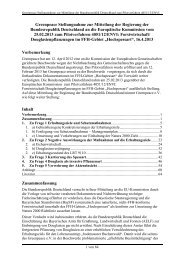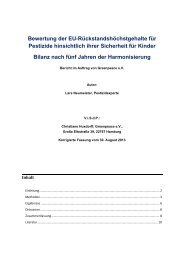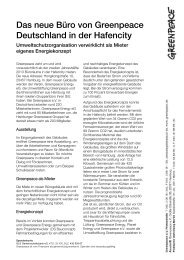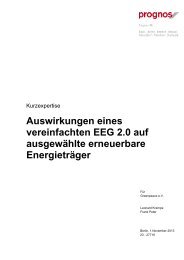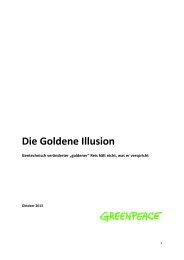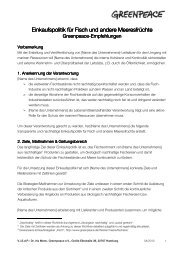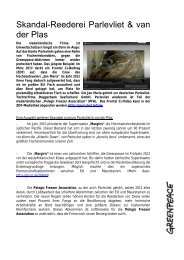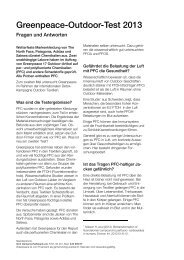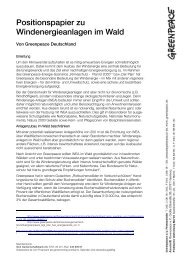SOLAR GENERATION - Greenpeace
SOLAR GENERATION - Greenpeace
SOLAR GENERATION - Greenpeace
You also want an ePaper? Increase the reach of your titles
YUMPU automatically turns print PDFs into web optimized ePapers that Google loves.
solar power is capable of supplying electricity to more than 1 billion people within two decades,<br />
even if we nearly double our overall electricity use in that time.<br />
This clear industrial and political commitment to the expansion of the PV industry implies that<br />
the current surge of activity in the solar electricity sector represents merely a foretaste of the<br />
massive transformation and expansion that this sector will bear witness to in the coming<br />
decades.<br />
This joint initiative adopted the title “Solar Generation” because it aims to define the role that<br />
solar electricity will play in the lives of a global population born today as it develops into a<br />
major energy consumption group and starts to enter the job market. The aim has been to<br />
examine how solar electricity will be perceived from both a consumer and business point of<br />
view within the time scale of a generation. The report highlights the triple benefits which solar<br />
energy offers the world - for the environment, for industry and for economic and social<br />
development.<br />
The international conference “Renewables 2004” held in June 2004 in Bonn was a small but<br />
important step towards an expansion of renewable energies world wide, responding to the call<br />
of the Johannesburg summit to increase the share of renewable energy and to keep up the<br />
momentum generated by the Johannesburg Renewable Energy Coalition. The European Union<br />
has played an important role in this process, following the recommendation of a preparatory<br />
regional conference to Renewables 2004 held in Berlin in January 2004 to:<br />
“...urge EU institutions to start a political process of setting ambitious, time bound targets for<br />
increasing the share of renewable energy in final energy consumption addressing the medium<br />
(2020) and long term time frames in due time to the Renewables 2004 in Bonn. A target value of<br />
at least 20% of gross inland energy consumption by 2020 for the EU is achievable.”<br />
This number could be even higher if coupled with stronger energy efficiency policies. Targets<br />
for renewable energy act as a powerful catalyst for governments to develop the necessary<br />
framework conditions for investments in renewable energy technologies. A powerful example<br />
is the EU Directive on the Promotion of Electricity from Renewable Energy Sources, which sets<br />
national indicative targets for all EU Member States. The targets have initiated political actions<br />
throughout the entire European Union to put in place framework conditions for renewable<br />
energies. Targets are an important first step in developing the clean energy sources of tomorrow<br />
that will contribute substantially to climate protection, but they must be followed by concrete<br />
political action.<br />
Reports are a useful guide, but it is people who change the world by their actions. We encourage<br />
politicians and policymakers, global citizens, energy officials, companies, investors and other<br />
interested parties to support solar power by taking concrete steps which will help ensure that<br />
more than a billion people will get electricity from the sun, harnessing the full potential of<br />
solar power for our common good.<br />
October 2004<br />
EPIA<br />
<strong>Greenpeace</strong><br />
Michel Viaud<br />
Secretary-General<br />
European Photovoltaic Industry<br />
Association (EPIA)<br />
Sven Teske<br />
Renewables Director<br />
<strong>Greenpeace</strong> International<br />
5



